GROUNDUP PHOTO ESSAY
Immigrants forced to survive in the midst of Joburg’s squalid ‘dark buildings’
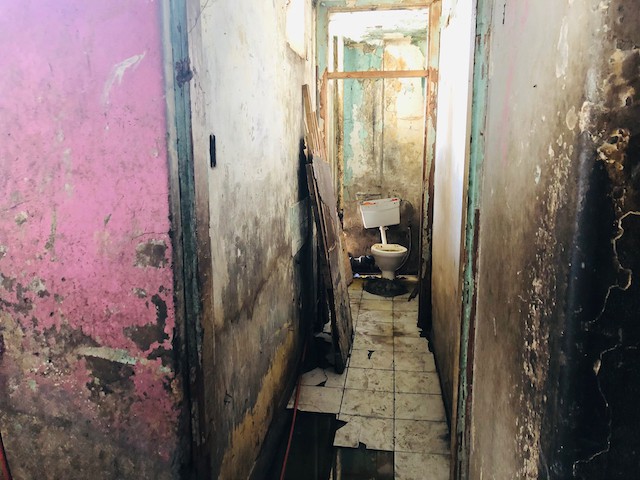
Migrants residing in decrepit and decaying central Johannesburg structures face repeated police raids, evictions, extortion, crime and endless poverty.
They are known as “mnyama ndawo” (isiXhosa for dark places) in central Johannesburg. To many locals, they are notorious places, dens of vice and blamed for all manner of crimes and social ills. But for thousands of vulnerable immigrants, they are a refuge.
The “abandoned” buildings in Ellis Park, Marshall Town, Faraday, Nugget and Jeppe Streets are home to people from Zimbabwe, Malawi, the DRC, Mozambique, Tanzania, Nigeria and other countries. Among them are asylum seekers, refugees, people with expired passports and undocumented immigrants. Most are unemployed and survive hand to mouth finding piecemeal work or selling things on the street. Some are blind or have other disabilities which have left them struggling to make an independent living which would have allowed them to rent formal accommodation.
During his term as mayor, Herman Mashaba tried to empty these buildings. Raids and searches by police and immigration officers in the night became commonplace. Over the years, the residents have sought help from human rights lawyers and immigration organisations. Similar action led last month to the Constitutional Court striking down a section of the police act that allowed for warrantless searches in cordoned off areas.
The buildings are dilapidated, without electricity, water or proper sanitation. Rubbish is strewn about; there is stagnant water and the stench of sewerage.
Syndicates extort rent from the residents. Robbery and theft are a constant hazard.
Immigrant children living with their parents in these buildings are used to this unstable life of serial evictions from one building to the next, hearing gunshots and seeing their homes being raided by police in the middle of the night. The children are often out of school due to a lack of documentation or simply because most parents are unable to afford the fees charged by schools in the city centre. Children often help their families by begging on the streets. Some have been taken into care by social workers.
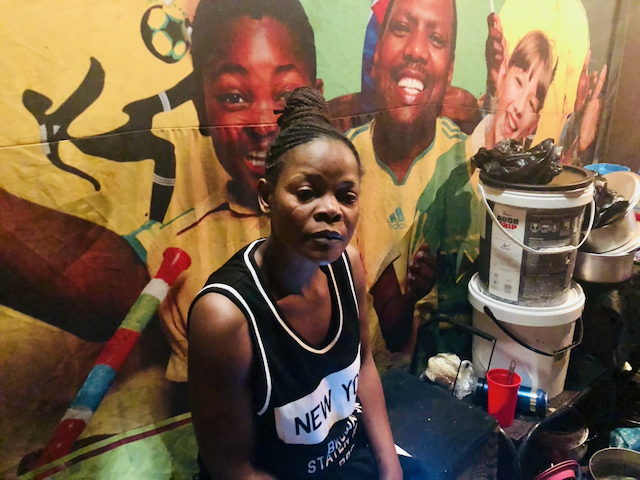
“At least we have the buildings to call home, but the life we lead is a gamble,” says Caroline Chitupa, a Zimbabwean immigrant who lives in one of the dark buildings in Ellis Park. (Photo: Kimberly Mutandiro)
“This is the life we live and sadly our children have also adapted to it. At least we have the buildings to call home, but the life we lead is a gamble,” says Caroline Chitupa, a Zimbabwean immigrant living in one of the dark buildings in Ellis Park, where families have been fighting off eviction since 2019. She survives by selling beer, though she often loses her stock when the police raid and confiscate her merchandise.
“Any time of the night while we are sleeping police voices come screaming into our homes, our doors are kicked open. We can’t remember how many times we’ve fixed doors or changed locks,” says Chitupa.
Consequently, her building has been nicknamed Baghdad.
Just last week the building was raided by police.
“They look for anything — drugs, alcohol, anyone living in the country illegally. But we are not criminals. All we want are better lives for ourselves and our children,” says Chitupa.
Inside, makeshift boards and curtains divide up the space for over 400 families, mostly Zimbabweans. People rely on illegal electrical connections and pay R2 to use toilets outside the building.
Chitupa says Mashaba came to the building and “expressed concern over our living conditions and wanted us to leave”.
“We have been told that the building was sold. But we will continue fighting because this is the only home we have known for years,” she says.

“There is nowhere else we can go, because we cannot afford to pay for better accommodation,” says Lazarus Chinhara, who is visually impaired. (Photo: Kimberly Mutandiro)
Lazarus Chinhara, who is visually impaired and a representative of Zimbabwe People with Disabilities living in South Africa, begs for a living. When he can, he sends money home to his family in Chivhu.
When the Covid pandemic struck he was repatriated to Zimbabwe. He would have liked to remain there, but conditions back home were so bad he returned to South Africa.
“There is nowhere else we can go because we cannot afford to pay for better accommodation,” he says.
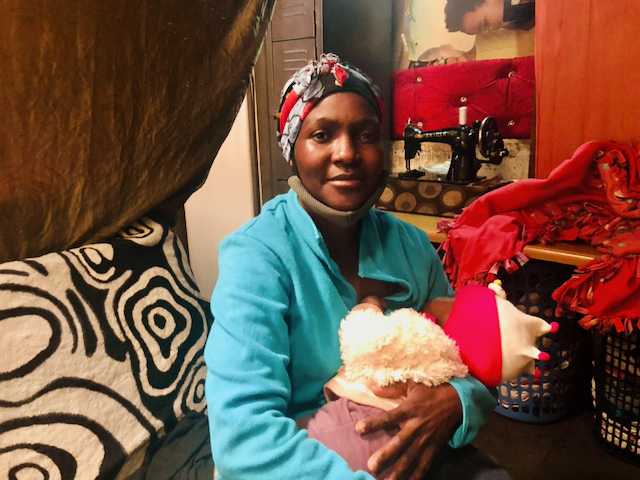
“When they finally evict us from this building l don’t know where l will go. It’s not easy to find a place where one can pay R250 a month,” says Cresenzia Puzi. (Photo: Kimberly Mutandiro)
Cresenzia Puzi lives with her five-month-old baby and four-year-old child. She has a small sewing business and struggles to pay R250 rent to the owner of her room. She sometimes begs at the traffic lights, especially at month-end when her rent is due.
“When they finally evict us from this building l don’t know where l will go. It’s not easy to find a place where one can pay R250 a month,” says Puzi.
Also facing eviction since 2019 are over 200 residents in a crumbling building on Marshall Street. Many were evicted from other buildings around Johannesburg. They say over the years they have been forced to pay rent to various people who claim to own the building.
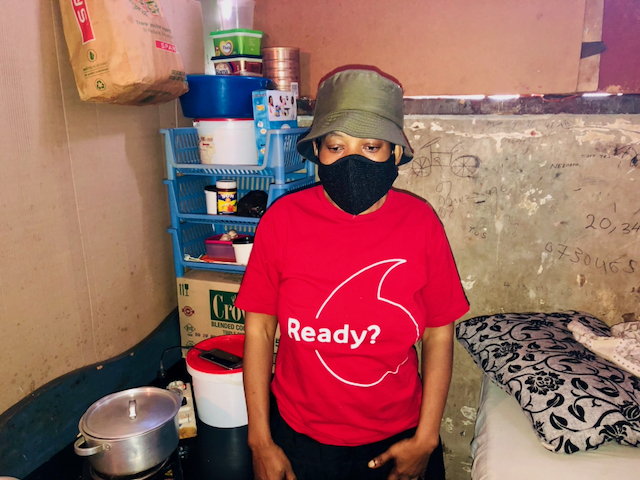
“Besides the police raids, thieves break into our homes at night and steal from us while we are sleeping,” says Shelina Marimo (Photo: Kimberly Mutandiro)
Shelina Marimo shares a single room and splits the R700 rent demanded of her with her roommate. She begs at traffic lights, looks for piecemeal jobs and collects second-hand clothes to send to her home in Chitungwiza.
“Besides the police raids, thieves break into our homes at night and steal from us while we are sleeping. We do not dare to step into the corridors even to go to the toilet [at night] because many people get mugged. Even so, we cannot move elsewhere because rents out there are expensive,” says Marimo.
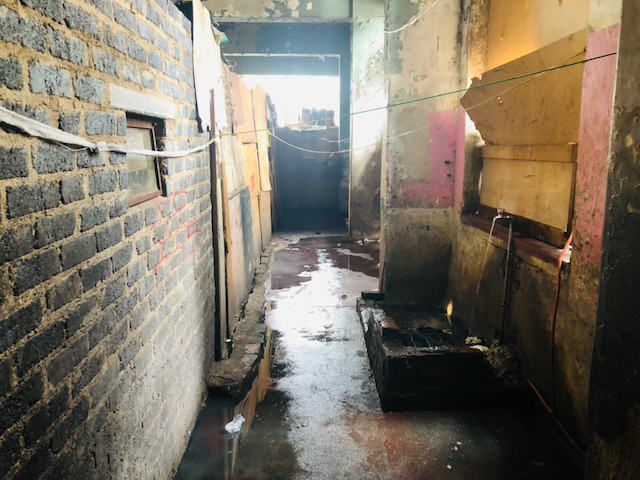
Inside the building where Amanda Macholo lives with her two children. (Photo: Kimberly Mutandiro)
Amanda Macholo, from Malawi, has two undocumented children, aged ten and 12. The pandemic put an end to her job as a domestic worker.
“We are only happy to have a roof over our heads. My wish is to send my children to school here in South Africa one day. I know the day will come,” says Macholo.
In another building, Faraday Chambers, up to five families share one room. Homeless people also sleep in the passages. The residents were evicted but later returned after legal action.
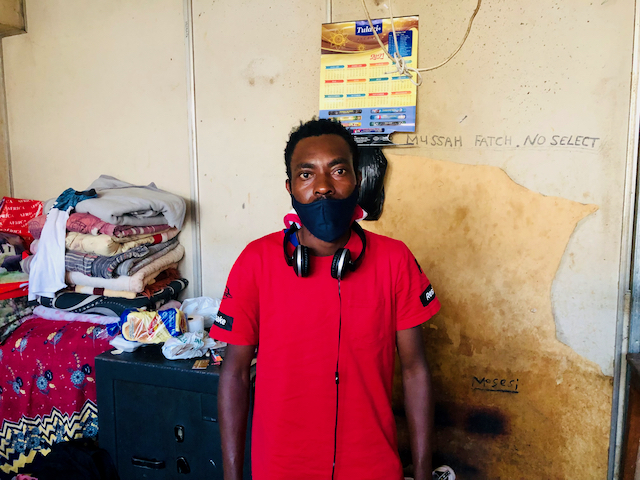
“Being immigrants is not easy because we struggle to find work,” says Fungai Fachi.
Fungai Fachi, originally from Zimbabwe, says, “We are only happy that the landlord agreed to keep us here. Being immigrants is not easy because we struggle to find work. We struggle to even put food on the table and many children are not going to school. But there is nothing we can do because going back home with no money is not an option.”

Beauty Chuma sells beer and operates a tuck shop inside one of the “dark buildings”. (Photo: Kimberly Mutandiro)
Beauty Chuma, from Malawi, sells beer and operates a tuck shop from her room. She manages to support her six-year-old son and sends him to school.
“Being able to send my son to school keeps me strong. It’s the reason why l remain here in South Africa operating my small business because back home l would not be able to. Sometimes l lose stock during police raids but l am not embarrassed to go and ask for money at the robots to restock again,” she says.
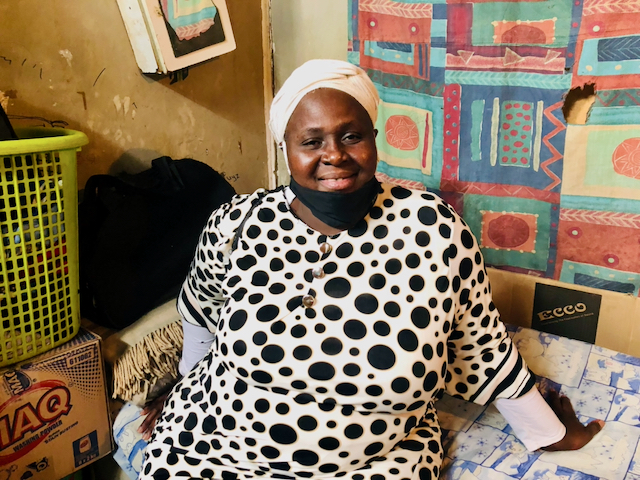
Ethel Madzinga works with the organisation Zimbabwe Isolated Women In South Africa. (Photo: Kimberly Mutandiro)
Ethel Madzinga, from the organisation Zimbabwe Isolated Women In South Africa (Ziwisa), also lives in one of the dark buildings. Between 2003 and 2017, she was evicted from five different buildings.
Ziwisa focuses on immigrant widows and people with disabilities. “We started sourcing food and empowerment projects for them by partnering with other organisations after seeing how most are struggling. Most of the people survive by begging on the street, doing small businesses, sex work and domestic work, but their lives have become more difficult due to the pandemic,” says Madzinga.
“Besides facing evictions, they are targeted by police and deported, yet getting legal papers is difficult. Some children get picked up by social workers while begging on the streets and we’ve had to engage with lawyers to help get the children back,” she says.
“We are determined to fight for the rights of immigrants because they deserve to live dignified lives just like other people and should be treated as such. Immigrant Lives Matter,” says Madzinga. DM
First published by GroundUp




















 Become an Insider
Become an Insider
Those were once wonderful sturdy buildings. What happened? Slumlords and municipal neglect. An article how about how central Johannesburg was allowed to decay starting in the 90s. The flight to Sandton was the death knell to Johannesburg and a beautiful environment got paved and ruined. As much as I feel for these people, I also think they should go home. How could it be worse there?
Migration is part and parcel of human history. Migrants have made positive contributions to the receiving countries. The solutions lie in integration of the migrants rather than in populist and xenophobic rhetoric of exclusion and marginalization. The cradle of humankind is only thirty minutes drive away from Hillbrow. We are all migrants. The developers of the German COVID-19 vaccine are of Turkish origin, just to name one example.
I agree that migration is part of human history and a good thing. But it’s also a numbers thing- our infrastructure is buckling and no country can accept over 5 million new arrivals. Also, let’s not romanticize – we do not know who many of these people are and given the war crimes that have been committed, it’s likely that some war criminals are here. The antiquated attitudes towards women and homophobia are also not welcome imports. It’s not all high minded principles – it’s practical details. Wealthy people are insulated from the pressures and can afford to be pious – but those attitudes would change if low cost housing went up in their neighborhood – or a refugee camp. The ANC in exile in Africa were kept in camps, so.
The authors, who have such intimate knowledge of the people and the conditions they live in should also advance ideas that could help to alleviate the situation….
No building can be renovated without the current occupants being removed. Buildings may have to be completely demolished as reinforcing, piping and wiring have frequently been removed.
Feed the public, political parties, NGO’s and authorities with practical suggestions as to the most effective and humane steps that could be taken……
In Pretoria office blocks have been converted into low cost, centrally located accommodation and seems a good way to go….
The last time I checked the definition of a criminal was someone who broke the law, including entering a country illegally, staying in a country beyond the expiration of permit, buying stolen goods like illegal electricity, illegally occupying someone’s private property without their consent…most/ all of which are satisfied in the above.
If not for any reason this is why Mashaba needs to be mayor and clean this up. These conditions are breeding ground for all that is bad including contagious diseases because people need to answer nature’s call and if there’s no services where do they go? Allowing this to continue is not sympathy but cruelty to those that are here legally, pay their taxes and do not cause problem for others.